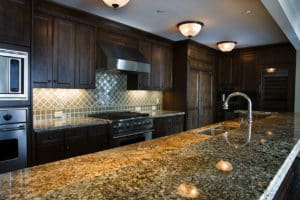
 ☰
☰

 ☰
☰
There are many stone countertop options available for your upcoming kitchen redesign. One of the most popular kitchen countertop materials is quartz. However, another option that isn’t as well known, but delivers equally beautiful outcomes, is Neolith. As the industry’s leading brand of sintered stone, Neolith has been gaining popularity in recent years. Both Neolith and quartz have their pros and cons, and it’s important to understand the differences between these materials to ensure you choose the right kitchen countertop option for your home.
Neolith is a lightweight sintered stone material that combines high performance qualities with high definition detail. Sintered stone slabs are composed of 100% natural materials including granite, glass and natural oxides. Neolith is made from a process that uses intense pressure and heat to bond these materials together. No resins or polymers are required, and the manufacturing process creates a hard, durable and versatile surface.
You have a wide range of color options with Neolith slabs, allowing the material to mimic the appearance of stone, wood or cement. This versatility makes Neolith an excellent option to complement just about any kitchen design you may have. It is suitable for all interior applications, and is commonly used with kitchen countertops, backsplashes and bathroom countertops.
Quartz is an engineered stone material made from ground quartz, resin and pigments. Approximately 90% of a quartz slab is comprised of the natural stone material, with the remaining 10% coming from the resin used to bind the ground quartz and any pigments used to achieve a specific appearance for the slab.
Quartz countertops are extremely versatile, providing an excellent option for a wide range of applications including kitchen countertops, bathroom countertops, bars, patios and just about any area where you may need a stone surface. They are known for their stunning appearance, which is one of the primary reasons for their popularity.
It can often be confusing to understand the differences between these two stone countertop materials, since they are both engineered products. The following comparison of their properties will help distinguish the characteristics of these two materials.
Both quartz and Neolith are highly durable. Quartz countertops are slightly more durable than Neolith countertops, and they will be more resistant to high pressure. However, both materials should be able to hold up to the impact of an object that is accidentally dropped on its surface.
Both quartz and Neolith have virtually zero porosity. As a result, both materials are highly waterproof and stain resistant since the stone surface won’t absorb any liquid spilled on your countertop. Even liquids such as wine, coffee and other highly staining substances won’t permeate quartz or Neolith countertops to leave a stain.

Quartz is a UV unstable material, which makes it a poor option for outdoor applications. Since quartz countertops can fade due to prolonged exposure to sun, it also may not be an ideal choice for indoor applications facing high sun exposure.
Quartz is a highly scratch resistant material, and your kitchen countertops won’t be damaged even when you cut directly on them. On the other hand, the scratch resistance of Neolith countertops depends on its finish. Matte and satin Neolith finishes will not scratch if you cut directly on them. However, polished Neolith finishes are more prone to scratching and as a result, you shouldn’t cut directly on your stone countertop.
Both Neolith and quartz are heat resistant materials, but there is a difference in their degree of heat resistance. Neollith surfaces are highly heat resistant and won’t burn, crack or sustain any damage even if you place a hot pan directly on your kitchen countertop.
While quartz is heat resistant under normal circumstances, it may get damaged if it comes into contact with an extremely hot pan or utensil. For this reason, you should always use a pad or trivet when placing a hot object on a quartz countertop.
Neolith countertops are extremely light weight and can be installed on top of other surfaces without concern. Quartz countertops are much heavier and may require additional structural support if they are installed on top of cabinets.
The nonporous surface of both quartz and Neolith countertops makes them easy to clean and maintain. Just use a soft cloth and soapy water to clean them.
If you’re unsure which of these options is best suited to your specific application, The Stone Collection is here to help. We have the largest selection of engineered stone products available, and our unique Get Inspired™ Experience will guide you through the process of identifying the right stone slab for your home.
As part of our Get Inspired™ Experience, you’ll work with one of our knowledgeable expert surface specialists who will explain the differences between quartz and Neolith surfaces in detail. They’ll discuss your specific needs and answer any questions you may have to ensure you fully understand your options. Then, they’ll recommend the ideal stone countertop option to meet your unique preferences.
We have gigantic, gallery-style, climate-controlled showrooms in Denver, Phoenix, Salt Lake City, Dallas and Fort Worth. No appointment is required. Simply pop in and discuss your needs with one of our surface specialists to get the process started. Once you decide on a slab, we’ll hold it for 14 days for free, giving your installer plenty of time to pick it up.
Contact us today or visit one of our showrooms to find the right stone slab for your upcoming project.